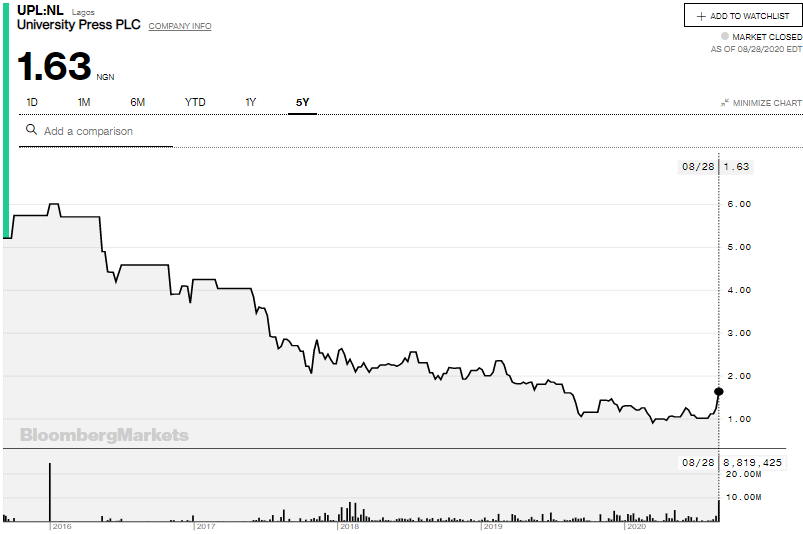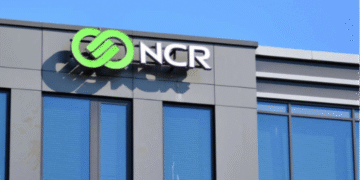University Press Plc (NSE Ticker: UPL) did not disappoint shareholders and investors with its financial performance for the full year ended 31 March, 2020. The printing and publishing company declared a dividend of 15kobo per ordinary share, a handsome dividend yield of 9.2% when calculated at the current share price of N1.63.
UPL on Friday 28 August, 2020 released its financial statements for the full year period ended 31 March, 2020, to the Nigerian Stock Exchange and the Investing public.
- Have you read?
- Ellah Lakes Plc is raising $40 million despite Zero Revenue in Current financial year
- GUINNESS reports 329.38% decline in Profit in 2020, writes off N10.266 billion worth of Assets
The company’s share price had already risen by 31.45% in the week to occupy the top of the gainers table; it began the week at N1.24 and closed at N1.63.
Analysis of the report: Income Statement
The company reported a 10.80% decline in revenue, from the N2.315 billion in 2019 to N2.065 billion in the year in review. The company’s revenue come from sales in 3 zones of the country, only the Eastern zone recorded growth in revenue; Western zone revenue declined from N986.476 million in 2019 to N918.149 million, Eastern Zone revenue grew from N467.800 million to N508.346 million, while the Northern zone declined from N861.429 million to N639.112 million.
A further review of the income statement shows that the company makes most of its revenue from the “Primary” product type which accounted for N1.207 billion (2019: N1.397 billion), the “Secondary” products type accounted for N789.429 million (2019: N854.010) while the “Tertiary/General reference” accounted for N68.678 million).
Possibly in response to the reduced revenue, the company also reduced its cost of sales by 19.21%, to record a gross profit of N1.220 billion (2019: N1.269 billion). Thus, the gross profit margin for the year was 59.09%, an improvement on the 54.84% achieved in the preceding year.
Further 6.97% reduction in the administrative expenses and also reduction in marketing and distribution expenses ensured that the company turned out an operating profit of N152.221 million, 24.02% growth from the N122.736 million operating profit reported in 2019.
After all expenses and tax, UPL reported a profit of N127.186 for the period, an increase of 16.68% from the N109.003 million reported in 2019. This represents a net profit margin of 6.16% (2019: 4.71%) and an Earnings Per Share (EPS) of 29kobo.
Analysis of the report: Statement of Financial Position
The company’s balance sheet shows no significant changes from what it was as at 31 March, 2019. There was only 0.53% reduction in total assets, a 9.23% reduction in total liabilities and a 2.39% increase in the total equity.
The reduction in the total liabilities was driven by a reduction in the trade payables, which was N557.435 million as at 31 March, 2020, but N404.506 million as at 31 March, 2020.
Analysis of the company’s balance sheet shows that 77.07% of its total asset is being funded by the shareholders’ equity while 22.93% was being funded by liabilities (In 2019, Shareholders’ equity funded 74.87% of total assets while 25.13% was funded by liabilities).
Interestingly, the company has no loans or borrowings on its balance sheet, neither short term nor long term debts.
Analysis of the report: Statement of Cash Flows
A review of the statements of cash flows, shows that the company was able to improve its cash flow, as at the end of the period in review, although this was not from its operating activities.
The cash movement was as follows;
- Net cash from operating activities was N138.839 million, down from N322.024 million recorded at the end of the preceding year.
- Net cash used in investing activities reduced to N28.974 million from N133.331 million, as the company spent less money on the purchase of property plant and equipment.
- Net cash used in financing activities remained the same; N64.712 million. In the absence of debts to repay or interest to pay on debts, the only expense here was the payment of dividend to shareholders.
Overall, the cash and cash equivalent the company had as at 31 March, 2020 was N576.853 million, up from the N531.701 million it had as at 31 March, 2019.

Table 1: Financial highlights
About the Company
University Press Plc is a company domiciled in Nigeria. It was founded in 1949 under the name Oxford University Press, Nigeria. It became incorporated as a limited liability company in 1978. It was quoted on the Nigerian Stock Exchange on 14th August 1978.
The company is engaged in the business of printing, publishing and selling of educational books. Its registered office is three crowns building, Jericho Ibadan.
UPL has a 431,409,504 outstanding shares, and a market capitalization of N703.197 billion as at the time of this report.
14.10% of the company’s stock is held by Oxford University Press, U.K while Awhua Resources Limited owns 9.31%, and Dr. Lalekan Are own 6.28%.
Price Movement
Just like every other stock on the Nigeria Stock Exchange, the company has seen an up and down movement in its price, but had rallied in the past couple of weeks to close the last trading session at N1.63, up by 27.34% YTD.
Over the last five years, the stock price has declined by 68.65%, 41.79% over the past three years, 21.26% over the past two years, but up by 18.98% over the past year.
Its 52 week high and low prices are N1.63 and N0.90 respectively.

Source: Bloomberg
Analyst’s View
Analyst at Investogist had this stock on their stock watch for the week ended 28 August, 2020 with a HOLD recommendation, having changed it from a BUY recommendation given earlier.
At current prices, the stock is trading at 5.53x its earnings, and have a Book Value of N6.19, and is mostly funded by Shareholders’ equity, all of which keeps the stock attractive.
Due to the Covid-19 pandemic and the lockdowns on economic activities, especially the closure of schools that utilize the company’s product, we believe this will have an adverse effect on the company’s financial performance in the current financial year.
We however maintain a HOLD rating on the stock from a long term perspective, but for a short term perspective, it might be better to sell the stock as it is customary for stock prices to decline post dividend.
Written by;
Nnamdi M.





















































